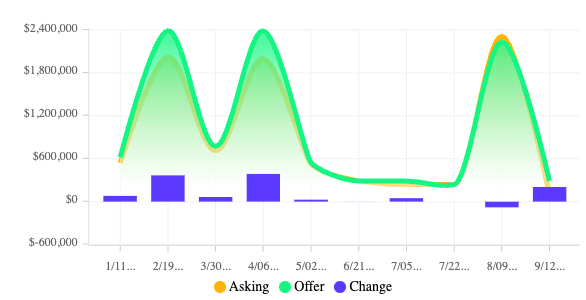Real Estate Finance
How Much Above Asking Price Should I Offer if I Want to Win the Bid on a Home but not Overpay?
Entering the real estate bidding arena can be both exciting and challenging, especially when faced with the dilemma of how much above the asking price to offer. Striking the right balance is crucial—winning the bid without overpaying requires a strategic approach. Here are key considerations to help guide your decision:
Factors Influencing the Offer Amount:
1. Market Conditions:
Seller's Market: In a seller's market where demand exceeds supply, offering above asking price may be necessary to stand out. Evaluate current market conditions to gauge competitiveness.
2. Comparable Sales (Comps):
Recent Sales: Analyze recent comparable sales in the area (comps). Understanding the prices of recently sold homes with similar features provides a benchmark for your offer.
3. Home's Features and Condition:
Unique Features: Consider the unique features and condition of the home. Well-maintained or upgraded properties may justify a higher offer, but be cautious not to overvalue subjective improvements.
4. Appraisal Contingency:
Contingency Planning: If offering significantly above asking price, be aware that the home must appraise for the agreed-upon amount. Include an appraisal contingency to protect your financial interests.
5. Budget and Affordability:
Financial Limits: Establish a clear budget and determine the maximum amount you can afford. While winning the bid is essential, it's crucial not to stretch beyond your financial means.
Strategies for Crafting the Right Offer:
1. Competitive Yet Realistic:
Balance is Key: Craft an offer that is competitive within the market but remains within the realistic range. Avoid succumbing to bidding wars that may lead to overpaying.
2. Incremental Increases:
Gradual Adjustments: Consider making incremental increases in your offer to test the waters. This approach allows you to gauge the seller's response without immediately offering the maximum.
3. Understand Seller's Priorities:
Flexibility vs. Price: Understand the seller's priorities. Some sellers may prioritize a quick closing or certain contingencies. Tailor your offer to align with their needs, which may influence their decision beyond the price.
4. Consult with Your Agent:
Professional Guidance: Your real estate agent can provide valuable insights. Leverage their expertise to assess market dynamics, evaluate comparable sales, and devise a winning but sensible bidding strategy.
5. Personalized Offer Letters:
Human Touch: Consider attaching a personalized offer letter to showcase your genuine interest in the home. Sometimes, a personal touch can make your offer stand out without solely relying on the price.
Final Considerations:
1. Emotional Preparedness:
Managing Expectations: Be emotionally prepared for potential bidding competitions. Establish a maximum offer amount in advance to prevent impulsive decisions.
2. Alternative Strategies:
Explore Other Strategies: If the bidding becomes too intense, explore alternative strategies. This may include looking for homes in different neighborhoods or considering properties with longer market durations.
3. Negotiation Room:
Factor in Negotiation: If your initial offer is close to the maximum you can afford, consider leaving some room for negotiation. This provides flexibility in case the seller counters your offer.
4. Timing is Key:
Quick Response: In a competitive market, respond promptly to counteroffers or negotiation points. Quick and decisive responses demonstrate your seriousness as a buyer.
Conclusion
Crafting a winning yet judicious offer in a real estate bidding situation involves a delicate balance. By assessing market conditions, understanding the property's value, and employing strategic negotiation tactics, you can increase your chances of securing the home without overpaying. Collaborating closely with a knowledgeable real estate agent ensures that your offer aligns with your goals while navigating the dynamics of the current real estate landscape. Remember, the right offer is not just about the price—it's a comprehensive strategy tailored to both market realities and your personal financial objectives.




